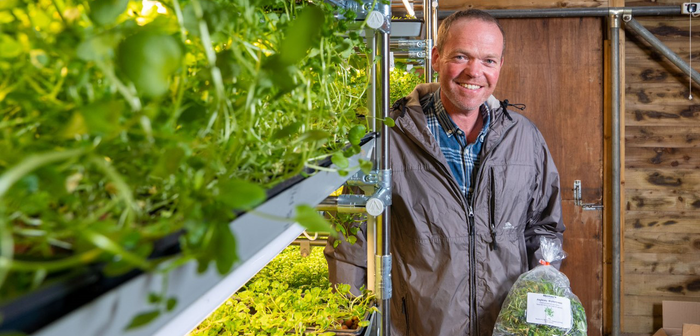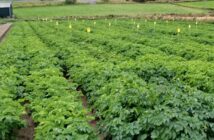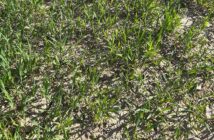Watercress grown on one of the island’s first Vertical Farms has sold out in hours at Hooton’s Homegrown, Brynsiencyn.
James Hooton and his family are well known for growing quality fruit and vegetables and rearing their own livestock. Their latest offer, watercress, was grown as part of Menter Môn’s ‘TechTyfu’ project, with James one of 3 commercial growers in Gwynedd and Anglesey to trial an innovative vertical farm growing system.
The family received support from TechTyfu, a project created by Menter Môn, to establish a vertical farm at their farm shop in Brynsiencyn over the Summer. Anglesey watercress is grown in a vertical farm unit, which uses a flood and drain hydroponic system to pump nutrient-rich solutions to the plant crop, enabling efficient and clean growth without soil.
“My family have been farming here since the early 1960s,” explained James Hooton, “and watercress is the latest produce we grow to supply our farm shop, Hooton’s Homegrown.”
“We have been using hydroponics to cultivate crops for many years, such as with the tabletop strawberries you’ll see at our ‘pick-your-own’ site. However this is the first time we’ve used a vertical farm system.”
“I’ve been impressed with the ease of using this system,” said James. “Being able to trial the system through the TechTyfu project has shown me that the system works well and offers a number of advantages. We plan to further trial the system by growing other crops such as pea shoots and various herbs.”
“Watercress is a fabulous source of vitamins and minerals. It is a little green wonder-leaf, and our customers have been delighted with the taste and quality of the Anglesey watercress we’ve produced.”
Gram for gram, watercress contains more calcium than milk, more folate than bananas, more Vitamin C than oranges and more Vitamin E than broccoli. It is highly nutritious and is packed with more antioxidants than the rest of the Brassica family it belongs to.
“With the winter months ahead, watercress’ nutritional content are sure to appeal to our customers and the vertical farm gives us the ability to produce this wonder food all year round,” shared James.
Luke Tyler, who is leading the project, says “Our project is helping position food production in North Wales to be more resilient, and open doors for farmers, businesses and restaurants looking for strategic ways to diversify. Anglesey watercress’ popularity proves that there is great demand for fresh, local produce”.
TechTyfu is creating a skill-sharing forum and is working in collaboration with local growers and food businesses to develop supply chains.
“Growing is often the most straightforward aspect of getting local produce to the market,” noted Luke. “The real challenge on our hands with TechTyfu is developing the supply chains so that every partner along the way makes a profit and fresh produce reaches the customer in excellent condition.”
Since participating with TechTyfu this year, and despite the challenging economic conditions, new doors have opened for growers such as James Hooton.
“We have further developed our own supply chain since collaborating with TechTyfu,” said James. “We have established a new route to market with a local fresh produce distributor, and it was thoroughly rewarding to see our rhubarb reaching various local restaurants.”
in addition to watercress, the project has already identified local opportunities for specialist crops such as pea shoots and a range of microgreens.
“Our estimate is that the market for pea shoots only is worth about £40-50k in Gwynedd and Anglesey alone,” noted Luke. “And by growing them locally, a grower would be able to offer unbeatable freshness. We have already had prominent local chefs asking where they could purchase local pea shoots.”
TechTyfu is a project run by Menter Môn. Luke Tyler can be contacted at luke@mentermon.com and the project can be followed on Facebook and Twitter.
TechTyfu has received funding through the Welsh Government Rural Communities – Rural Development Programme 2014-2020, which is funded by the European Agricultural Fund for Rural Development and the Welsh Government.




